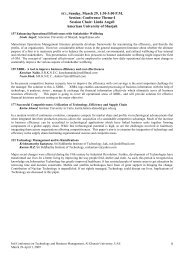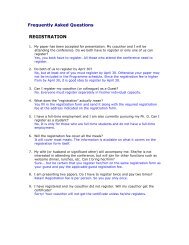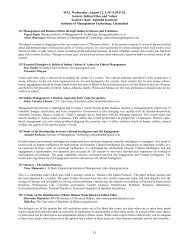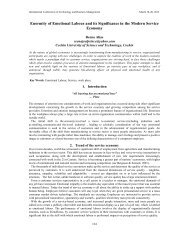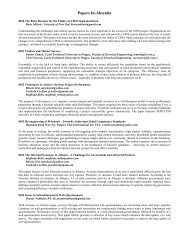Contributed Papers - Icmis.net
Contributed Papers - Icmis.net
Contributed Papers - Icmis.net
You also want an ePaper? Increase the reach of your titles
YUMPU automatically turns print PDFs into web optimized ePapers that Google loves.
2D-7, Sunday, January 2, 3:50-5:30 P.M.<br />
Session: Technology in B-schools<br />
Session Chair: Rahul Kulkarni<br />
Smt. S. M. Agrawal Institute of Management<br />
8310 ERP Implementation in Educational Institutions: Challenges and Opportunities<br />
Shruti Maheshwari, IIPS, shrutifabs@gmail.com<br />
Preeti Singh, IIPS, purnima4@rediffmail.com<br />
For quite some time, the goal of technology leaders has been to integrate the information systems applications in their<br />
organizations. Many organizations have looked to enterprise resource planning (ERP), frequently with costs exceeding crores of<br />
rupees, as a means to achieve inter-departmental integration and cross-functional integration of processes. A typical ERP system<br />
includes a complete set of applications including student management, accounts management, recruitment and admissions,<br />
management. The replacement of an old system with a new system has it's own special problems. There are always pressures on<br />
implementation deadlines and shortcuts, not all of which are feasible or desirable<br />
8316 ERP in Educational Institutions: SWOT Analysis<br />
Shruti Maheshwari, IIPS, shrutifabs@gmail.com<br />
Preeti Singh, IIPS, purnima4@rediffmail.com<br />
With the rapid commercialization of education, institutions need to counter the five forces including rivalry, the threat of<br />
substitutes, buyer power, supplier power, and barriers to entry more efficiently than ever before. And in order to achieve the same,<br />
the institutions are streamlining their core and the support functions through an integrated and agile information system, an ERP.<br />
Traditionally, ERPs have shown a positive total economic impact for leading institutions globally. However, an unsuccessful ERP<br />
implementation has its own challenges. The SWOT presented here on the usage of ERP in the education system will unearth the<br />
real life business implications<br />
8327 Framework for E-Readiness Assessment of Colleges for Educational E-governance<br />
Rahul Kulkarni, Smt.S.M.Agrawal Institute of Management, aim.rahul@gmail.com<br />
Pramod Chaudhari, M.J. College, prchaudhari58@yahoo.com<br />
Rajendra Waghulade, M.J. College, prchaudhari58@yahoo.com<br />
E-readiness of colleges is critical factor in the success of educational e-governance. The colleges must be “e-ready” in terms of<br />
infrastrucre, the accessibility of ICT to the population at large etc. If we conduct e-readiness assessment of colleges before<br />
planning for e-governance, we can clearly know the digital divide. The efforts can be made to bride the digital divide and have<br />
effective e-governance. Assessment of e-readiness has many proven techniques. In this paper we propose framework for<br />
assessment of e-readiness of colleges intended for educational e-governance.<br />
8385 Impact of Enterprise Resource Planning Tools & Techniques in Management Education<br />
Bharat Kantharia, IBS, bharat_kantharia@hotmail.com<br />
Historically, management education is fragmented with different bodies of knowledge taught by functional specialists. Although<br />
students become specialists in their area, they often miss the complete picture where interdependencies and interconnectedness<br />
among various business processes create efficient synergies in achieving business targets.It is observed that majority of ERP<br />
implementations are failure. Management educators need to design syllabi & take initiatives to meet current requirements of &<br />
challenges faced by different business sectors.As per author, out of almost 2000 management education institutes in India, only<br />
small number of management institutes has included ERP based courses in curricula.<br />
8396 Variables Affecting Gap between ERP Systems and End-users in a B-School<br />
Kalpana Kumaran, ITM Business School, kalpanas@itm.edu<br />
Though educational institutions implement enterprise resource planning systems, it remains underutilized. Therefore, there is a<br />
need to find the gap between enterprise resource planning systems and end users. This study investigates the variables affecting<br />
the gap between enterprise resource planning systems and end users in a Business School. To test the hypothesis, Bivariate and<br />
Multivariate techniques were used with the aid of SPSS 12.0. The results indicate that there is a gap between the enterprise<br />
resource planning systems and the end users due to lack of end-user involvement, lack of business process re-engineering,<br />
insufficient training and improper technical support.



